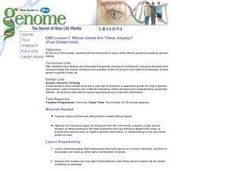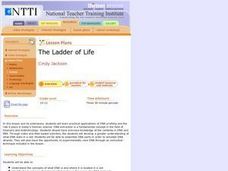Curated OER
Genetics Practice: Beyond the Basics
What do you get when you cross a purple with a white? Genetics geniuses figure it out with a Punnett square. On this assignment, they must solve crosses for incomplete dominance, codominance, lethal dominance, and sex-linked genes. It is...
Curated OER
Paradise Lost: Picture Book Activity
Readers of Paradise Lost draw parallels between Milton's tale and Gene Zion's Harry the Dirty Dog, an illustrated children's book.
Curated OER
Genome: The Secret of How Life Works
What do you have in common with a fruit fly? About 60 percent of your DNA. The resource, divided into two units, is intended for grades four to eight and another for high schoolers. Both units include eight lessons covering the...
Howard Hughes Medical Institute
Human Skin Color: Evidence for Selection
Skin color is controlled by at least six genes. Young scientists learn about skin colors through a documentary. They discuss the topics of pigment, natural selection, and vitamin D absorption. They apply their knowledge to higher order...
Curated OER
Plant Biotechnology: Controlling Tissue Differentiation
Young scholars demonstrate hormonal control of plant tissue differentiation and relate this differentiation to gene expression. They explore the effects of hormones (auxin and cytokinin) on the genes that control tissue differentiation...
Curated OER
Human Genetics: Yes/No Exercise
In this science instructional activity, learners demonstrate their knowledge of human genetics by completing a Yes/No exercise. Students read the statement about genes and DNA and agree or disagree with it. No information is given on the...
Curated OER
Extracting DNA
Students explore DNA, genes, chromosomes and the chemicals that make up DNA. They research Internet resources to develop their knowledge of DNA. They conduct an experiment to separate DNA from peas and create a poster that they can use...
Curated OER
Human Genetics Acrostic Poem
In this science worksheet, students demonstrate what they know about DNA and genes by writing acrostic poems. The vertical format is prepared on this page for students. There is no information on the page.
Curated OER
Probability and Genetics
Students determine the offspring from a genetic cross. In this biology lesson plan, students use Punnett squares to find probability. They explain how genes are passed from parents to offspring.
Curated OER
Genes
In this biology worksheet, 9th graders identify and locate various vocabulary terms related to the study of genes. There are 18 biology terms located in the word search.
Curated OER
Chromosomes
For this chromosomes worksheet, students complete a crossword puzzle with 33 questions about genetic mutation in chromosomes. They identify traits associated with certain genes.
Curated OER
Genetics
Young scholars explain the difference between dominant and recessive genes, identify what causes differences in the traits of parents and their offspring, and explain how sex is determined. They will also improve their reading and...
Curated OER
The Acetate Animal Hunt
Students determine which adaptations allow an organism to survive and reproduce in a certain environment. Students act as "predators" to pick up acetate discs "prey" scattered around the classroom. Students list the number found, the...
Curated OER
Dragon Genetics Lab-Principles of Mendelian Genetics
Young scholars study genetic traits using popsicle sticks as chromosomes. In this biology lesson, students explain how traits are inherited from parents. They differentiate dominant and recessive genes.
Curated OER
Green Genes: Genetically Modified Organisms in Our Food
Students investigate how and why genetically modified organisms are used as food crops. They identify the advantages and disadvantages of these crops through internet research then present their views and discuss them as a large group.
Curated OER
Gene Action/Mutation Worksheet
High schoolers define the following terms: mutation, mutagen and give examples of how they work. They also define and illustrate a point mutation. Students define and illustrate a frame shift mutation and name two types of frame shift...
Curated OER
Identifying Disease Genes using BLAST
Young scholars navigate the National Center for Biological Information (NCBI) website and BLAST program to conduct a variety of biological assignments.
Curated OER
Whose Genes Are These, Anyway?
Students explore some of the ethical questions raised by genetic testing. They answer the question of whom, if anyone, has rights to knowledge of each person's genetic make-up.
Curated OER
The Ladder of Life
Students explain the concepts of what DNA is and where it is located in a cell, identify the two types of molecules that make up the rungs of a DNA molecule and identify the two types of Purine and Pyrimidine molecules
Curated OER
People Are Like Peas in a Pod
Students experiment with pea pods to observe/appreciate the diversity of individuals within a population, and to explain of how dominant and recessive traits, genotypes, and phenotypes help produce variation in a population.
Curated OER
DNA Extraction From Onion
Students extract DNA from an onion using household equipment and supplies.
Curated OER
Cells: Structures and Processes
Students explore the basic unit of life, the cell in this nine lessons unit. The cell structure of animal and plant cell functions and how they affect our world are probed in this unit.
Curated OER
Who am I and Why?
Learners make comparisons about themselves and others, which are real and meaningful. They study some basic concepts in the area of genetics and do a complimentary series of experiments, or explorations that illustrate these concepts
Curated OER
Simulation of Gene Splicing
Students use the exercise as a prelude to a "wet" lab or as a substitute for such a lab. It correlates well with colony transformation labs. This lab is recommended for students what have difficulty with the abstractions that genetic...
Other popular searches
- Dominant Genes
- Dominant and Recessive Genes
- Recessive Genes
- Genes and Heredity
- Chromosomes and Genes
- Genesis
- Dna, Genes & Chromosomes
- Dominate and Recessive Genes
- Traits and Genes
- Ethnicity Genes
- Color Genes
- Genes Alleles

























